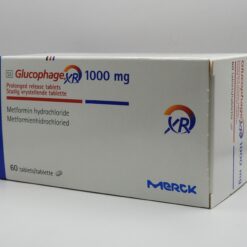
Bio-glibenclamide (5mg tablet x 100)
$8.84
Bio-glibenclamide is a medication available in the form of a 5mg tablet. It belongs to a class of drugs known as sulfonylureas and is primarily used in the management of type 2 diabetes. Bio-glibenclamide works by stimulating the release of insulin from the pancreas, which helps lower blood sugar levels. It is typically prescribed alongside a proper diet and exercise regimen to control diabetes. The medication should be taken as directed by a healthcare professional and may have potential side effects, so it is important to follow the prescribed dosage and discuss any concerns with a doctor.
Bio-glibenclamide is a medication available in the form of a 5mg tablet. It belongs to a class of drugs called sulfonylureas and is primarily used for the management of type 2 diabetes mellitus. This medication helps control blood sugar levels by stimulating the pancreas to release more insulin and by improving the body’s sensitivity to insulin.
Usage Information: Bio-glibenclamide is typically prescribed as part of a comprehensive treatment plan that includes diet, exercise, and weight control. It is important to follow your healthcare provider’s instructions regarding the dosage and frequency of administration. The tablets are usually taken orally with a meal to reduce the risk of hypoglycemia (low blood sugar).
It is essential to regularly monitor blood sugar levels while using Bio-glibenclamide to ensure effective diabetes management. Your healthcare provider may adjust the dosage based on your individual needs and response to the medication.
Side Effects: Like any medication, Bio-glibenclamide can cause side effects, although not everyone experiences them. Common side effects may include:
- Hypoglycemia: Taking too much Bio-glibenclamide or not eating enough can lead to low blood sugar levels, resulting in symptoms such as shakiness, dizziness, sweating, confusion, and headache. It is important to monitor your blood sugar levels regularly and seek immediate medical attention if hypoglycemia occurs.
- Gastrointestinal Effects: Some individuals may experience stomach upset, nausea, vomiting, or diarrhea. These side effects are usually temporary and improve with time.
- Skin Reactions: Rarely, Bio-glibenclamide may cause skin reactions such as rash, itching, or hives. If you develop any skin-related symptoms, inform your healthcare provider.
- Allergic Reactions: In rare cases, individuals may experience allergic reactions to Bio-glibenclamide. Symptoms may include difficulty breathing, swelling of the face, lips, tongue, or throat, and severe dizziness. Seek immediate medical attention if you experience any signs of an allergic reaction.
It is important to discuss any concerns or unusual symptoms with your healthcare provider. They can provide guidance, monitor your progress, and adjust your treatment plan as necessary to ensure optimal diabetes management while minimizing side effects.
| Weight | 0.06 kg |
|---|---|
| Dimensions | 3 × 3 × 1 cm |
Related products
Cipla-pioglitazone is a medication available in the form of a 30mg tablet. It contains the active ingredient pioglitazone, which belongs to a class of drugs called thiazolidinediones. Cipla-pioglitazone is primarily used in the treatment of type 2 diabetes mellitus. It helps to improve blood sugar control by increasing the body's sensitivity to insulin, a hormone that regulates blood sugar levels. This medication is typically prescribed as part of a comprehensive treatment plan that includes diet, exercise, and other anti-diabetic medications. As with any medication, it is important to follow the prescribed dosage and consult with a healthcare professional for personalized advice and guidance.


